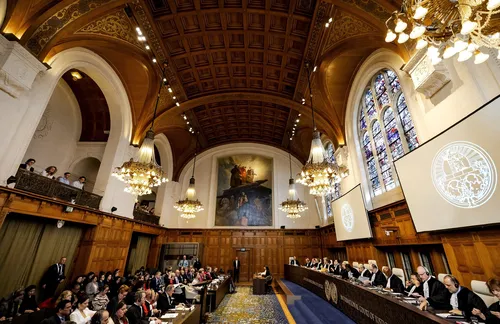
The vice-president of Venezuela, Delcy Rodríguez, presented this Monday (8) a document with the country’s defense of the territory of Essequibo, disputed with Guyana, at the International Court of Justice, in The Hague, in the Netherlands. The text calls for compliance with the Geneva agreement, signed between Guyana and the United Kingdom in 1966, which defined that the dispute over the territory would be based on dialogue in a “manner satisfactory to all parties”.
The Venezuelan document is called by the government a “historic position in relation to the dispute with Guyana” over the region. In the Netherlands, the vice-president once again criticized the Paris arbitration award, signed in 1899, which gave part of the territory to the United Kingdom. “The 1899 award was a fraud. Venezuela never consented to the Court’s jurisdiction over this territorial dispute. The only valid instrument is the 1966 Geneva Agreement,” said Rodríguez.
The Venezuelan Ministry of Relations released a document with 18 topics that are in the defense submitted to the UN Court. The text says that the Venezuelan government learned in March 2018 that Guyana had unilaterally requested the validity of the 1899 report from the International Court of Justice. The foreign ministry called the episode “one of the most serious events in the dispute over Essequibo”.
Still according to the text, Venezuela views the measures of the International Court of Justice with distrust because of the region’s energy potential. In 2015, the American company Exxon Mobil found huge offshore oil reserves off the coast of Essequibo. According to experts interviewed by the Brazil in factthe product discovered is lighter than Venezuelan oil, which makes refining easier and cheaper.
The document from the Venezuelan Foreign Ministry contests the decision of the American oil company and the government of Guyana to consider the issue as resolved and advance the exploration process in Essequibo. Venezuela also said that the United States government is putting pressure on the case, threatening peace in the region and asking the Guyanese to return to the negotiating table.
Guyana calls Venezuela’s stance illegal and says that President Nicolás Maduro has “expansionist” intentions.
Law on Essequibo
Delcy’s trip to the Netherlands takes place in the wake of the law promulgated by the President of Venezuela, Nicolás Maduro, on Essequibo. The “Organic Law for the Defense of Guyana Essequiba” intends to formalize the decision taken in a referendum by the population last year to treat the territory of Essequibo, in dispute with Guyana, as a Venezuelan state.
The law sanctioned by Maduro had already been presented by the president himself in December 2023, shortly after the referendum that collected the population’s opinion on the dispute over the territory. The law was approved in the first round in Parliament on December 6th and in the second round on March 21st.
The text determines a transitional period for incorporation, until elections are held to choose a governor for the new state that would be created. Until then, the territory would be legislated by the Venezuelan National Assembly. The law also determines that Venezuela will choose a head of government who will work provisionally in Tumeremo, in the state of Bolívar (south), close to the border with the disputed area.
Another issue indicated by the law is that maps that contain the territory of Venezuela must show the state of Essequibo.
Guyana’s President Irfaan Ali said the law is “illegal” and violates “fundamental principles of international law.” He also stated that the decision “contradicts” the meeting between him and Maduro held in December 2023 in Saint Vincent and the Grenadines, which concluded with a document stating that the two countries would maintain dialogue to resolve the issue.
The dispute
With 160 thousand km², the Essequibo territory has been the subject of dispute since the 19th century. After the oil discoveries in the region by Exxon Mobil in 2015, Guyana handed over concessions so that the company could explore reserves that are estimated at more than 11 billion barrels of oil and made Guyana’s GDP the fastest growing in the world, according to projections by the International Monetary Fund (IMF).
The decision displeased Caracas, which claims that Georgetown could not have unilaterally issued concessions in an undelimited territory. In the document submitted by Venezuela to the International Court of Justice, the country’s Ministry of Foreign Affairs accuses Guyana of following the interests of Exxon Mobil and inciting a conflict in the region.
Guyana accuses its neighbor of “expansionist intentions” and since September has been allowing US military exercises on the border. The country’s president, Irfaan Ali, states that “the controversy must be resolved at the International Court of Justice [CIJ]”, a scope that is rejected by Caracas, despite presenting its defense this Monday (8).
According to the National Electoral Council, around 10.5 million voters participated in the referendum and 95.93% agreed to incorporate Guyana into the map and grant citizenship to the more than 120,000 Guyanese living in the region.
Editing: Rodrigo Durão Coelho

Source: www.brasildefato.com.br

